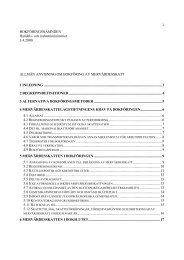Knowledge Intensive Services' Suppliers and Clients
Knowledge Intensive Services' Suppliers and Clients
Knowledge Intensive Services' Suppliers and Clients
You also want an ePaper? Increase the reach of your titles
YUMPU automatically turns print PDFs into web optimized ePapers that Google loves.
43<br />
that is uppermost on the left. Such a KIBS may act as a source of intelligence on the<br />
competition faced by the firm: it may be studying the technology used by competitors<br />
<strong>and</strong> the available information on their new product <strong>and</strong> process strategy, examining<br />
records dealing with their plans for establishing operations in various locations, looking<br />
at market reports concerning their recruitment strategies, <strong>and</strong> so on. As with all KIBS,<br />
such functions may be internalised within the client firm, or “outsourced” to a<br />
specialised KIBS provider. One factor affecting this may be confidentiality issues –<br />
when a KIBS serves several companies in the same sector, it may have to tread very<br />
carefully <strong>and</strong> erect internal barriers to prevent confidential knowledge “leaking”.<br />
This discussion raises the question of “absorption capacity”. The client must be<br />
able to make use of the knowledge inputs from the KIBS. Even when a function has<br />
been practically entirely ceded to a service provider, the client still has to play a role<br />
in managing the service relationship – to ensure that it is receiving what it needs at<br />
the appropriate cost.Thus it is likely that some knowledge functions relevant to the<br />
KIBS will still need to be retained in-house by the client.<br />
Continuing with the discussion centred on Figure 3, the KIBS are seen to be<br />
mediating the flows of information depicted here.But what does this mean? It can<br />
involve selecting or actively processing the information, or structuring the<br />
relationships involved in the flow.There is thus a wide range of quite distinct<br />
operations that may be performed by KIBS here (though in practice many KIBS<br />
will perform several of these operations at any one time). The activities may centre<br />
on:<br />
• Locating information <strong>and</strong>/or creating it (from data, research, etc), <strong>and</strong><br />
processing <strong>and</strong> presenting it in useful forms to the organisation.This information<br />
can be about information about the organisation itself or its<br />
environment. The KIBS’ problem-solving activities may not necessarily<br />
mean coming up with new solutions, generating new knowledge, then.<br />
The KIBS task may involve application of methods of locating what can<br />
be labelled as “best-practice” – in other words, a solution to the problem<br />
that is already being demonstrated within the client organisation or elsewhere.<br />
“Benchmarking” has become a widely used tool for examination<br />
of how different actors are seeking to cope with common problems.<br />
• Presenting information about the company <strong>and</strong> its operations to external<br />
<strong>and</strong>/or internal audiences. In some cases (e.g. auditing) this may involve<br />
extensive location <strong>and</strong>/or creation of the information. In some other cases<br />
it may be largely a matter of processing data h<strong>and</strong>ed directly from the<br />
organisation. And in many cases it will involve some negotiation bet-
















